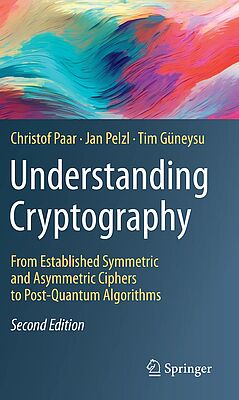The new edition contains revisions and updates based on the evolution of the field in the past 15 years. Its biggest addition is a new chapter on Post-Quantum Cryptography, which has quickly emerged as a leading field as we approach the era of Quantum Computing.
The first edition of "Understanding Cryptography" written by Christof Paar and Jan Pelzl is currently used by hundreds of universities around the globe. The aim of the authors is to make modern cryptography accessible to a broad audience, thus the readers with minimal knowledge on the concepts covered can still understand the material. The book focuses on cryptographic algorithms with real-world application, being a great fit for both undergraduate and graduate level students with a keen interest in cybersecurity.
The second edition will provide students and instructors with updated and revised materials, keeping up with the current developments in the field of cryptography. Of particular note is the new chapter on post-quantum cryptography: classic public-key schemes will be easily decrypted once quantum computers with practical size will be developed. Thus, all web applications will be forced to introduce quantum-resistant schemes, which are explained in this book. At the end of each chapter, updated reading lists and problem sections are also provided. This will ensure that students have all the materials and guidance that they need in a single book.
About the authors
Christof Paar is a founding director at MPI-SP in Bochum and affiliated professor at the University of Massachusetts Amherst. His research lies in the area of embedded security. He is one of the spokespersons of the Cluster of Excellence CASA: Cyber Security in the Age of Large-Scale Adversaries.
Jan Pelzl is professor for Computer Security at Hamm-Lippstadt University of Applied Sciences. His research focus is on applied cryptography and industrial cybersecurity. He has extensive experience working as consultant for industry and public organizations.
Tim Güneysu is professor and head of the chair for Security Engineering at the Ruhr University Bochum, Germany and Professor/Senior Researcher at the German Research Center for Artificial Intelligence (DFKI). He studies the secure design and implementation of (embedded) systems. He is also a member of the Cluster of Excellence CASA.
General note: In case of using gender-assigning attributes we include all those who consider themselves in this gender regardless of their own biological sex.


